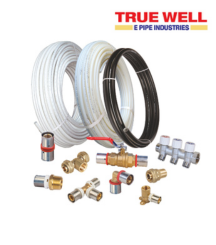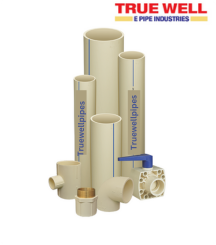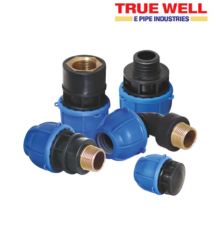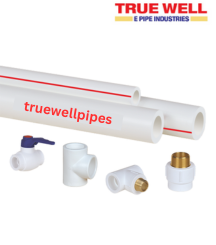At truewellpipes Pipes, we specialise in providing complete plumbing solutions with our high-quality pipes, created using advanced manufacturing techniques for enduring strength. Our pipes, including CPVC pipes and UPVC pipes, are built to resist corrosion and cracking, ensuring a reliable, leak-proof performance for transporting potable water. Made of tough materials, they deflect UV rays, chemicals, corrosion, and are durable, making them suitable for various applications such as homes, businesses, and industries and can withstand extreme temperatures and weather conditions.




Pipes and plumbing systems are essential components of modern infrastructure, designed to transport water, gas, and
waste efficiently and safely. Plumbing relies on a network of pipes, fittings, and valves, made from materials like
copper, PVC, or stainless steel, to ensure durability and resistance to corrosion. These systems are crucial in
residential, commercial, and industrial settings, providing clean water for consumption and sanitation while disposing
of wastewater hygienically. Proper installation and maintenance of plumbing systems are vital to prevent leaks,
blockages, and contamination, ensuring long-term functionality and environmental sustainability.
Pipes and plumbing systems form the backbone of modern infrastructure, enabling the distribution of clean water, the
removal of wastewater, and the safe delivery of gases in homes, businesses, and industrial facilities. Plumbing systems
utilize a range of pipes, fittings, and valves, crafted from materials such as copper, galvanized steel, PVC, PEX, and
stainless steel, each chosen based on specific applications and environmental conditions. These systems are integral to
public health, providing access to potable water and supporting efficient sanitation.
Plumbing systems are typically divided into two categories: water supply and drainage. The water supply system delivers
pressurized clean water from municipal sources or wells to fixtures such as faucets, showers, and appliances. Meanwhile,
the drainage system relies on gravity to transport wastewater away from buildings to treatment plants or septic systems.
Advances in plumbing technology, such as smart water meters, water-saving fixtures, and efficient pipe designs, have
significantly improved water conservation and reduced energy consumption.
In addition to functionality, the installation, repair, and maintenance of plumbing systems are critical to ensuring
safety and reliability. Leaks, clogs, or improper installations can lead to water damage, increased utility costs, and
even health risks. Therefore, skilled plumbers and advanced diagnostic tools are vital for maintaining optimal
performance. Furthermore, regulations and building codes ensure plumbing systems meet safety and environmental
standards, protecting both users and the ecosystem.